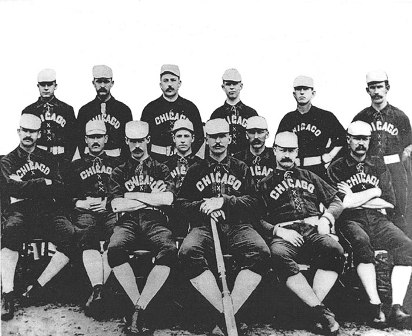There was never a dull moment during the Chicago Orphans 1900 training trip to Selma, Alabama. New manager Tom Loftus arrived with twenty-three players from West Baden, Indiana on March 23—two more players, Jimmy Ryan and Bill Everitt would be joining the team in a few days. The Chicago Tribune said, “Loftus is pleased with the grounds and the players are agreeably surprised at the town and hotel.”

Tom Loftus
The team was greeted in Selma with a parade and presented keys to the city; the stay in Alabama went downhill from there.
Rain in Selma disrupted the team’s practice schedule and the day Jimmy Ryan arrived it was revealed that there was a conflict between the leftfielder and his manager.
The Chicago Inter Ocean said Ryan, who claimed playing left field in Chicago’s West Side Grounds the previous season had damaged his eyes, announced he would not play the “sun field” for the team in 1900.
“(Ryan) intimated there was nothing in his contract which calls upon him to play in the sun field and that he will not do it unless he is given more money.”
Ryan told the paper:
“Let some of the young fellows put on smoked glasses and try the sun field for a while. I am a right fielder and am tired of getting the hard end of the deal. If they want me to play in the sun field it is up to Loftus for it is worth more money.”
Loftus responded:
“I don’t understand any such talk as this. Ryan will play where he will make the most money for the club…I am running this club just now, and the men will play where I put them.”
The dispute went on for several days and included an offer to Ryan to join Selma’s local team if he chose to quit.
Ryan wasn’t the only disgruntled player. Clark Griffith, who won 22 games for the team in 1899 told The Tribune:
“It is only a question of time when we all have to quit, and the sooner a man quits the better off he will be, for it is a cinch he won’t have a cent, no matter how long he stays in this business.”

Clark Griffith
A few days later The Tribune said it appeared Griffith and utility man Charlie Dexter had quit
“Clark Griffith and Charles Dexter have announced they are no longer members of the Chicago ball team. This morning the two men, one of whom Chicago ball cranks have relied on to bring the pennant westward, announced they will start with a week for Cape Nome to mine gold.
“Griffith has been wild all spring to go to Alaska. Some friend offered Griffith and (Jimmy “Nixey”) Callahan $20 a day as common laborers if they would go to Cape Nome. This morning Griffith and Dexter were talking and Griffith declared he would go in a minute if he could get someone to go with him. Dexter accepted the chance, declared he would go, and within a few minutes the pair had deposited their diamond rings with Tim Donahue as a forfeit, each agreeing to forfeit the rings in case they failed to start for Cape Nome inside a week. Both men are in earnest”
Loftus didn’t take Griffith’s plan seriously, but the threat highlighted the growing dissatisfaction of his star pitcher, which would be reflected in his performance during the 1900 season. There was no report of whether Griffith and Dexter forfeited their diamond rings when they failed to leave for Alaska.
The final incident of the Orphans’ Selma trip resulted in one of the most unusual reasons for a game to be delayed.
Griffith was on the mound during the early innings of an intersquad game, Tim Donahue was at the plate when according to The Inter Ocean:
“(A) Southern Gentleman opened up with a .44.”
The Chicago Tribune said:
“Just as the game was starting a young native, inspired by a desire to show the players his ambidexterity with revolvers, crossed the bridge (over the Alabama River) firing volleys. As he approached the park he began he began firing at will, and for ten minutes gave a wild South exhibition of cannonading inside the park.”
Once inside the park, the man fired first in the direction of the players, and then, after reloading, “at the feet” of several local children watching the game.
He then “turned his attention to the ball players.” The Inter Ocean said:
“He began shooting across the diamond, and every man on the field made a slide on the ground toward the shelter of the grand stand in a manner which would have been a guarantee of the championship, if repeated in regular league games.”
The paper said Tim Donahue, “who was never known to slide a base, went fifteen feet on his ribs” under the stands. While Jimmy Ryan “made a dash” for left field “which broke the sprinting record. He was last seen crawling under a dog hole in an extreme corner of the grounds.”
The gunman was taken into custody by Selma police, and The Tribune said the playing was “nervous and erratic,” after the shooting incident, but incredibly the game continued and was completed.
Griffiths “Scrubs” defeated Donahue’s “Regulars” 13 to 12.

The Box Score
Things didn’t get any better for the team after they opened the 1900 season; the Orphans limped to a 65-75 sixth place finish under Loftus. Ryan, who still often played the “sun field”, hit .277, his first sub .300 season since 1893. Griffith, who won 20 games the previous six seasons, won just 14. Charlie Dexter had his worst season, hitting just. 200 in 40 games and Donahue hit just .236 in his final season in Chicago.
Tags: Bill Everitt, Charlie Dexter, Chicago Orphans, Clark Griffith, Jimmy Ryan, Nixey Callahan, Tim Donahue, Tom Loftus, West Side Grounds


























